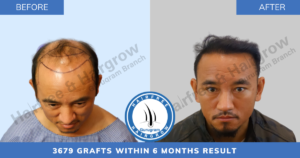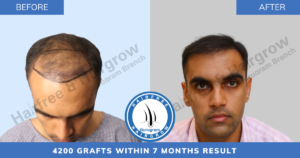Telogen Effluvium
What is Telogen Effluvium?
It is a type of hair shedding that occurs during the telogen or resting phase of the hair growth cycle. It is opposed to anagen effluvium, in which hair shedding occurs during the growth stages. It is usually caused by a hormonal imbalance, but taking medications that cause hormone imbalance can also cause hair loss. 
Because this type of hair loss is temporary, hair usually begins to recover on its own. However, if a pattern of hair loss is discovered, the hair loss will worsen and you will need to consult a hair specialist. A doctor will usually request a scalp biopsy, and telogen hair loss will be present if the hair end is roundish bulbous or clubbed.
Scalp biopsy is very significant because it indicates the anagen to telogen ratio and how many hairs are resting and how many are actively growing. In a normal healthy person, approximately 85 per cent of hair is actively growing, while the remaining 15 per cent is resting. Hair loss can increase as a result of shock caused by fever, infections, or anything else, and at its peak, approximately 70% of hair can enter the telogen phase. A hair follicle normally grows anagen hair for 4 years or more, followed by a 4-month resting phase known as the telogen phase. Telogen effluvium does not result in total baldness, but it can be a genetic predictor of future baldness.
Telogen effluvium usually corrects itself. Eating a healthy diet rich in protein, fruits, and vegetables will promote hair growth, and if your hair loss is severe, you can visit Hair Free Hair Grow for the Best Hair Transplant.
Hair Loss
⦿ About Hair Loss
⦿ Male Hair Loss
⦿ Female Hair Loss
⦿ Androgenetic Alopecia
⦿ Alopecia Areata
⦿ Traction Alopecia
⦿ Anagen Effluvium
⦿ Telogen Effluvium
⦿ Cicatricial Alopecia
⦿ Folliculitis
Before and After









